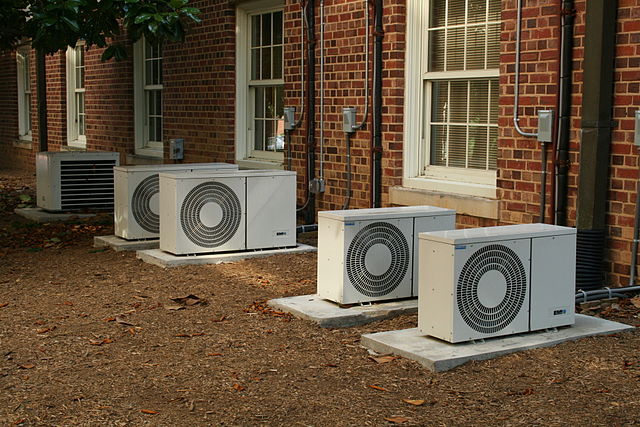 Ildar Sagdejev / https://creativecommons.org/licenses/by-sa/4.0/
Ildar Sagdejev / https://creativecommons.org/licenses/by-sa/4.0/
Climate Feedback Loops Threaten National Security
When a house is on fire, do firefighters pour accelerants on the fire? If your response was no, why then are we pouring accelerants on the fire known as climate change? Climate change is increasing air temperatures, which may expand air conditioning (AC) use, increasing energy demand. Currently, the vast majority of U.S. energy comes from fossil fuels; increased use of fossil fuels will feed climate feedback loops, making the problem worse and posing a risk to U.S. national security interests. To mitigate this problem, we must transition to cleaner energy sources. Continued delay will only exacerbate existing climate security risks.
Energy Demand and Feedback Loops
As global temperatures rise, places that historically have not needed AC, such as the American North, Midwest, and Pacific Northwest, may need it. With more AC units working hard to cool homes and businesses, large-scale utility companies will likely seek more fossil fuels to meet demand. Rather than expanding energy sources to include now cheaper clean energy sources, utility companies may double down on fossil fuels, for fear that their current investments in fossil fuels will become stranded assets.
Utility companies’ resistance to adopt clean energy has costly consequences for the planet. Fossil fuels release large amounts of carbon dioxide, a scientifically verified climate-changing greenhouse gas. The more fossil fuels we burn, the more carbon dioxide is being released into the atmosphere, further increasing global temperatures. Increased warming leads to increased energy demand for cooling and, in turn, the burning of more fossil fuels. This cyclical pattern is known as a climate feedback loop, and these loops will continue to increase global temperatures.
Security Implications
As feedback loops continue to increase air temperatures, the effects of climate change will worsen: hotter average temperatures, more intense and frequent storms, economic damages, and adverse effects on human health, among other things.
One effect of warming temperatures, not commonly considered, is the impact on military training. Extreme heat can exacerbate existing health conditions, cause heatstroke, and even death. A joint report from NBC News and InsideClimate News found 1,766 cases of heatstroke or heat exhaustion among active-duty service members in 2008, which increased by almost 60% by 2018. These numbers are not the full extent of the damage either; there are significant financial costs to these health impacts. Heat-related injuries cost the military nearly $1 billion from 2008 to 2018. The hotter it becomes, the more these numbers will continue to increase.
When temperatures are too hot, outdoor military exercises are suspended for fear of the adverse health effects of strenuous activity under extreme heat. These are called Black Flag Days. The number of Black Flag Days will increase as the climate warms, and the limited ability to train outdoors will affect military preparedness.
Another climate risk, and probably more commonly considered, is an increased frequency and intensity of storms and other weather phenomena. As temperatures rise, the ocean intakes excess heat from the atmosphere, and as the ocean warms, evaporation increases. Increased evaporation makes the resulting thunderstorms that comprise a hurricane, wetter and stronger; the warmer the ocean, the more powerful the storm. This logic applies to droughts, wildfires, and floods as well. Increased evaporation over land and worsening storms will increase rainfall in some areas while drying out others; the drier an area, the more susceptible it is to massive wildfires.
From the wildfires burning the West to the hurricanes battering the South, more powerful storms mean more loss of life, property, and vital infrastructure in civilian settings and on military bases. Energy grids are some of the most vulnerable and important infrastructures affected by these storms. Long-term, mass power outages can be debilitating for critical military bases that rely on energy grids for disaster response and readiness. Although these bases have backup generators, they can only run for a few days at the most and repairing a power grid can take weeks, so increasing grid resilience is a national security imperative. Increased demand is already affecting the grid; external strain in the form of storm damage will compound the problem, adding rolling blackouts to the long list of adverse impacts.
Solutions
To prevent feedback loops from snowballing irreversibly, we must transition to clean energy sources, such as renewables and nuclear. Clean energy decreases global emissions and can meet increased energy demand without adding to the warming feedback loop.
One hindrance to the increased use of clean energy is the lack of energy storage capacity. We have ways to generate all the energy we need from renewables like solar, but nowhere to store it until it is ready to be used. Increased investment in and political commitment to the research and implementation of increased storage capacity would help overcome this problem.
We need to transition away from fossil fuels sooner than later. We have the technology, and now we need the societal will. Delaying this transition further will only make climate change worse, ultimately weakening our national security. We need to fight this fire with water, not oil.





